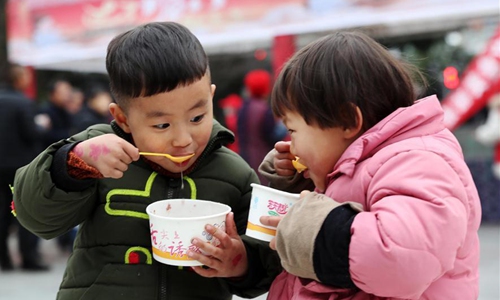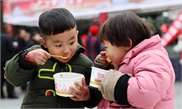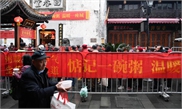Chinese temples to not offer traditional on-site Laba porridge following recent COVID-19 outbreak

Children eat Laba porridge at Qianjiang District in southwest China's Chongqing, Jan. 2, 2020. The Laba Festival, literally the eighth day of the 12th lunar month, is considered a prelude to the Spring Festival, or Chinese Lunar New Year. It is customary to eat Laba Porridge on this day. Photo: Xinhua
Some popular temples in Beijing, Shanghai and East China's Hangzhou have cancelled their on-site free porridge services to celebrate the Laba festival following the recent COVID-19 outbreak in China, as it is tradition for Chinese people to eat Laba congee for the Laba Festival.
Chinese people always eat Laba porridge on Laba, literally meaning the eighth day of the 12th lunar month. Laba porridge contains a nutritious mix of grains, beans, millet, sorghum, dried lotus seeds and other ingredients.
The Tanzhe Temple in Beijing, the Longhua Temple and Jade Buddha Temple in Shanghai, as well as the Lingyin Temple in Hangzhou have all announced they will not offer free porridge on-site in a bid to prevent the spread of COVID-19 among public gatherings.
However, Lingyin Temple said they began to make the traditional Laba porridge on Wednesday, which was the first day of the 12th month of the Chinese lunar calendar, and will prepare 300,000 servings of porridge for Hangzhou residents. The tradition has been the same for 14 years; the porridge will be sent to communities and nursing homes. But this year, all related staff will take nucleic acid tests and vehicles will be disinfected.
Shanghai's Jade Buddha Temple will also prepare 4,000 servings of porridge for some communities.
Laba is always regarded as a prelude of the Chinese Lunar New Year, and some believe eating Laba porridge can bring abundance and a good harvest. In previous years, residents would line up to receive their porridge in temples very early in the morning.


